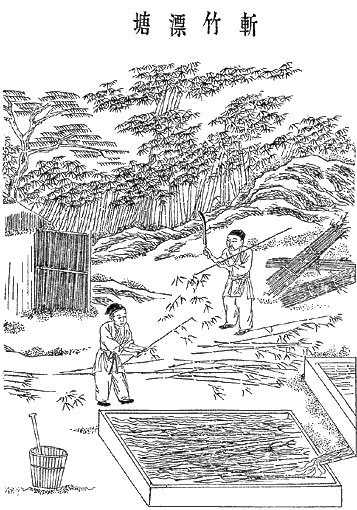Song Yingxing — Great Scientist and the Writer of Tiangong Kaiwu
Song Yingxing (1587 — 1666), courtesy name Changgeng, was a great scientist and a loyal official of the late Ming Dynasty (1368 — 1644).
He was a loyal official and a brilliant scholar who wrote Tiangong Kaiwu, a great technological encyclopedia.
However, with the fall of the Ming Empire, everything changed.
He and his brother’s life experiences were representatives of those talented and loyal people living at the end of the empire.

Part of Painting "Prosperous City Nanjing of the Ming Dynasty" (Nan Du Fan Hui Tu), By Artist Qiu Ying (1497 — 1552) — National Museum of China
Happy Life in Early Years
Song Yingxing was born into an ordinary family and had a happy childhood.
He and his brother went to school together; they were brilliant and highly appreciated by their teachers.
Then, they participated in the Imperial Examination of their province; Song won third place while his brother won sixth.
They were delighted and participated in the National Imperial Examination several times, but they all failed.
Therefore, Song Yingxing and his brother decided to take the political positions that the government assigned them, which were based on their scores in the province’s examination.

Jade Tablet Carved with Exquisite Landscape Patterns of the Ming Dynasty — Shanghai Museum (Photo by Dongmaiying)
The Masterpiece Tiangong Kaiwu
Song Yingxing worked as a teacher for four years, and most of his important books were written during this peaceful period, including Tiangong Kaiwu.
This book documented over 130 detailed agricultural and manufacturing technologies; most of the contents were first-hand information combined with explicit illustrations, including paper-making, gunpowder weapons, coal mining, metallurgy, mechanisms, etc.
The book's name means humans using specific technology to exploit the wealth of nature, which was also the fundamental philosophy and purpose of his works.
After one of his friends supported him published the first edition, this masterpiece became popular.
Later, he and his brother got promoted because of their excellent performances.

Illustrations of Paper Making Procedure in Tiangong Kaiwu, GIF Provided by Morning2k.
Fall of the Ming Empire and the Disruption of Song Yingxing's Family
In 1644, Chongzhen Emperor Zhu Youjian committed suicide, and the Ming Dynasty ended.
Song Yingxing and his brother quit their jobs and returned to their hometown.
Soon, another king from Ming's royal clan organized another Ming Empire in southern China; Song Yingxing and his brother planned to move southward to serve this new empire.
However, their province was soon occupied by the Qing's Manchu army.
When the Manchu army marched into their city, his brother Song Yingsheng committed suicide.
Song Yingxing escaped, refused to serve the new empire, and lived in seclusion and poverty until he died.
In his late years, he wrote many other articles, poems, and a biography of his brother.

Carved Lacquer Pen of the Ming Dynasty — Zhejiang Museum (Photo by Dongmaiying)
Buried and Ruined Masterpieces
Decades later, Qianlong Emperor (1711 — 1799) commanded to compile the Siku Quanshu (Complete Book Collection in Four Sections), which includes approximately 800 million Chinese characters.
The ruling class then found that Song Yingxing and his brother were loyal to the Ming Empire and had written many articles that were disrespectful to the Qing Dynasty, so they destroyed and banned all of their works.
Their books and glorious ideas were all burnt into dust with many other exceptional masterpieces.
However, Song Yingxing's Tiangong Kaiwu was spread and well-preserved in Japan and other countries.
Until the Qing Dynasty ended three hundred years later, this remarkable technical encyclopedia spread back to China, and people finally got to know this great scientist.
His other articles, however, were unfortunately buried in the dark forever.
Song Yingxing completed most of his significant works within the first four years while working as a teacher. However, the chaos, wars, and collapse of the Ming Dynasty forced him to halt his scientific research.
No one could know what else he would have achieved if the society had been stable or if the transition of dynasties was not that cruel.

Auspicious Animal (Lu Duan) Shaped Censer of the Ming Dynasty — Guangdong Museum (Photo by Dongmaiying)
Next Story: A Controversial Traitor — Wu Sangui
You Might Also Like:
Ming Dynasty (1368 — 1644) — Epoch of All Round Prosperity
Handsome and Rakish Artist with Solemn and Stirring Ending — Ji Kang
A Talented Writer with Lachrymose Behavior and Great Whistle Skill — Ruan Ji
A Politician with Integrity, a Brave General, and Calligrapher — Yan Zhenqing
A Wonderful Art Professor Emperor and A Humiliated Prisoner — Zhao Ji
A Heroic Knight, A Great Poet, and A Sincere Patriot — Xin Qiji of the Song Dynasty
An Intelligent, Tragic Genius, and Sincere Believer — Fang Xiaoru
A Great General and An Intelligent Philosopher — Wang Shouren
An Exceptional Artist and His Pathos Life — Tang Yin
The Luckiest Emperor and Saboteur of Historical Relics — Qianlong Emperor
Famous, Influential Figures in the History of China
Brief, Comprehensive Introduction to Chinese History
